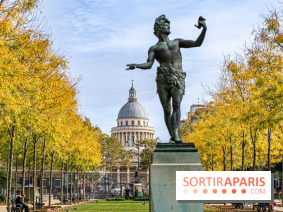Being able to take a few day-leave every month without loosing time off to better cope with period? This is what 68% of the French women are dreaming of – according to an Ifop survey conducted for 20 Minutes and Eve and co, a period panty brand. About a third of women would like to be able to go on a leave for a few days without losing their pay to better handle their pain or stock of menstrual protection.
Because one of the determining factors in this need of extra leave is menstrual precariousness. This survey reads that 24% of women say they have used fewer menstrual protections than they need because they could not afford it; and 19% confess they have had to choose between buying menstrual protections and another first-necessity item. Even more worrying, 18% could not buy pads at all when struggling financially, and 15% of them have had to make they very own protections. All in all, a third of women surveyed have encountered a period of menstrual precariousness. The phenomenon mostly affects women under 30 years old (37%) and poor women (48%).
Règles élémentaires association founder and director general Tara Heuzé-Sarmini explains in 20 Minutes newspaper: “menstrual precariousness has several faces. Homeless people, poor workers, students, single-parent families… The plague of menstrual precariousness is pervasive and leads to severe psychological and physical risks: loss of confidence, perceived discomfort, or shame; infections, diseases sometimes deadly (for instance in the worst cases of toxic shock syndrome)”.
And to make the daily lives of many women easier, the French surveyed unveiled they were ruling for many measures: free sanitary material ‘vending’ machines in public facilities (92% for), and companies (90%), reimbursement of period products by the social security system (approved by 81% of the women), and the implementation of a menstrual leave, “that is to say a period the person suffering from painful period can take one or two-day sick leave”, as wished by 68% of the surveyed.
Yet, this idea does not delight everyone. According to feminist Georgettes Sand association founder Ophélie Latil, a menstrual leave could become a factor discriminating women’s employment in companies. She thinks that “rather than granting menstrual leaves, we better improve care provided by osteopaths who attend period-related pain. Menstrual pains are no fatality”. The feminist added: “menstrual leave makes women essential because it associates period with pain, and it could add an extra mistrust when hiring women in companies. We are already discriminated enough”.
Writer Elise Thiébaut – who wrote a book about period – yet cannot deny results of the survey: “if 68% claim for it, it shows they feel it is needed. Rights should be extended as they have been for night shifts”. Thiébaut is also happy about the share of women ruling for free feminine products: “this is a huge step forward. When I released my book, and said I was ruling for it, people used to open their eyes wide. It shows the shame and the feeling of illegitimacy bound to period are decreasing”.
Will France follow Scotland make sanitary products free? Yet this choice can be risky, Heuzé-Sarmini warns: “choosing universal free products, one takes the risk of creating dependence to disposable: all experimentations on free products, in France, England, Scotland, the United States were based on disposable products. Massively subsidizing these products could occur at the cost of innovation, especially in reusable hygienic products, yet more body and environment-friendly”.
But the survey shows the trend leans towards ecology and reusable, and more eco-friendly and body-friendly practices. The Ifop investigation shows the choice of period protections used depends on several factors: practical (79%), comfortable (82%), healthy (66%), or to prevent toxic shock syndrome (61%).
Protecting the environment is only a determining factor for 33% of the women for now, but this share might increase over the years. So far, 4% of the women surveyed use washable pads, 3% cups, and 7% menstrual panties. Yet, 69% of women are interested in using period-special panties.
20 Minutes details the methodology used to conduct this survey: “the investigation has been carried in a sample of 1,009 women representing the female French population aged 15 to 49. The representativity of the sample has been guaranteed by the quota-method given socio-demographical, socio-professional, and geographic criteria. Interviews have been conducted by self-administered survey from March 18 to 19, 2021”.















